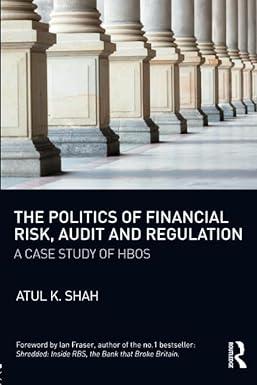Question
The Troubled Asset Relief Program (TARP) Consider a bank that has assets of 100, capital of 20, and shortterm credit of 80. Among the banks
The Troubled Asset Relief Program (TARP) Consider a bank that has assets of 100, capital of 20, and shortterm credit of 80. Among the banks assets are securitized assets whose value depends on the price of houses. These assets have a value of 50.
a. Set up the banks balance sheet.
Suppose that as a result of a housing price decline, the value of the banks securitized assets falls by an uncertain amount, so that these assets are now worth somewhere between 25 and 45. Call the securitized assets troubled assets. The value of the other assets remains at 50. As a result of the uncertainty about the value of the banks a ssets, lenders are reluctant to provide any short-term credit to the bank.
b. Given the uncertainty about the value of the banks assets, what is the range in the value of the banks capital?
As a response to this problem, the government considers purchasing the troubled assets, with the intention of reselling them again when the markets stabilize. (This is the original version of the TARP.)
c. If the government pays 25 for the troubled assets, what will be the value of the banks capital? How much would the government have to pay for the troubled assets to ensure that the banks capital does not have a negative value? If the government pays 45 for the troubled assets, but the true value turns out to be much lower, who bears the cost of this mistaken valuation? Explain. The Troubled Asset Relief Program (TARP) Consider a bank that has assets of 100, capital of 20, and shortterm credit of 80. Among the banks assets are securitized assets whose value depends on the price of houses. These assets have a value of 50.
Suppose instead of buying the troubled assets, the government provides capital to the bank by buying ownership shares, with the intention of reselling the shares when the markets stabilize. (This is what the TARP ultimately b ecame.) The government exchanges treasury bonds (which become assets for the bank) for ownership shares.
d. Suppose the government exchanges 25 of Treasury bonds for ownership shares. Assuming the worst-case scenario (so that the troubled assets are worth only 25), set up the new balance sheet of the bank. (Remember that the firm now has three assets: 50 of untroubled assets, 25 of troubled assets, and 25 of Treasury bonds.) What is the total value of the banks capital? Will the bank be insolvent?
e. Given your answers and the material in the text, why might recapitalization be a better policy than buying the troubled assets?
Step by Step Solution
There are 3 Steps involved in it
Step: 1

Get Instant Access to Expert-Tailored Solutions
See step-by-step solutions with expert insights and AI powered tools for academic success
Step: 2

Step: 3

Ace Your Homework with AI
Get the answers you need in no time with our AI-driven, step-by-step assistance
Get Started


